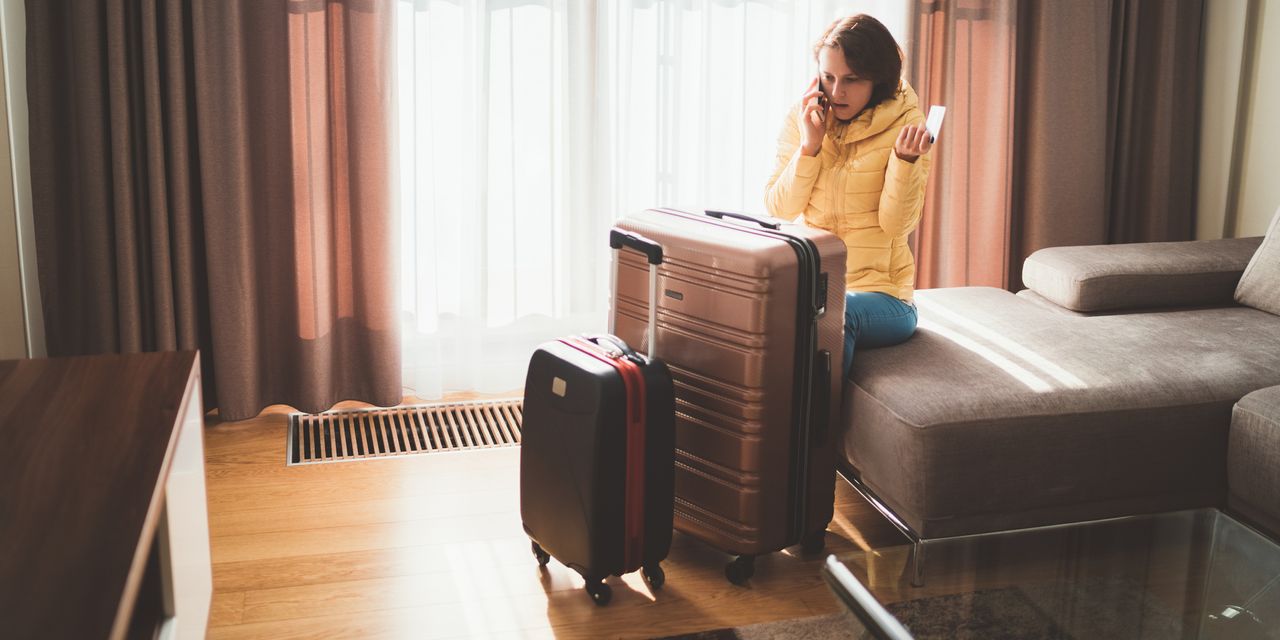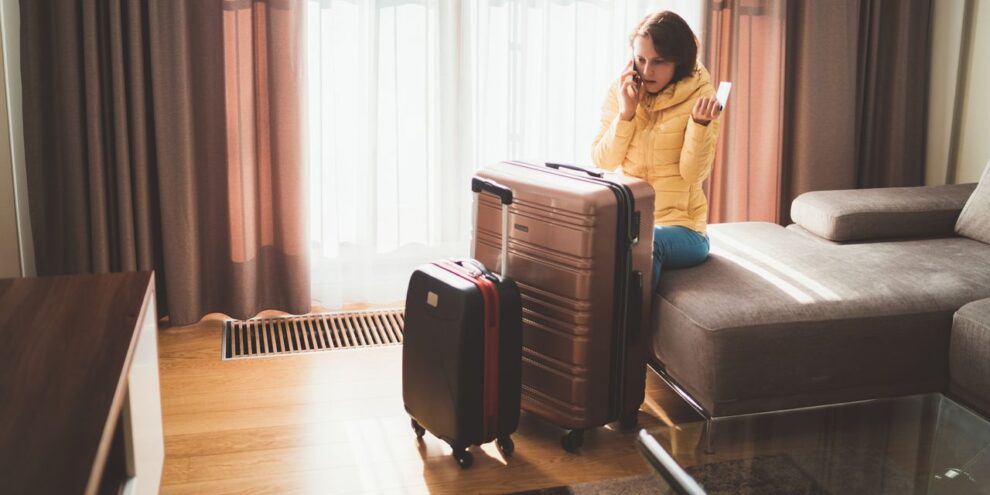
Jamie Kennedy and her husband, Josh Roth, were eagerly looking forward to the trip they had planned this December to New York City and London for Christmas.
As avid theatergoers, they were excited to once again take in the song and dance of Broadway and the West End. “We were going to see one of our favorite performers, Jeremy Jordan, in ‘Little Shop of Horrors’ off-Broadway,” Kennedy, 33, said, adding that the couple also had tickets to the London productions of “Six” and “Back to the Future: The Musical.”
Kennedy and Roth were also set to reunite with friends and family they hadn’t seen in person since their November 2019 wedding. They had even scored a reservation at the famed TWA Hotel in New York.
But on Monday, just an hour before their flight from Los Angeles to New York was supposed to take off, they decided to cancel their trip. Since the omicron variant was first discovered, they had kept a close eye on the number of new COVID-19 cases in both New York and London. Ultimately, even though they both always wore face masks in public and had received booster doses of the COVID-19 vaccines, the couple decided the risk wasn’t worth it.
“Our biggest fear was potentially contracting the variant in NYC, testing when we landed in London and having to spend our whole vacation quarantining in a hotel room and losing all of our money,” Kennedy, who works as television editor, said.
“‘You will not find the liberal cancellation and change policies that we had at the height of the pandemic.’”
Even though the omicron variant now accounts for a majority of new COVID-19 cases in the U.S., the surge in cases hasn’t had a major impact on domestic travel so far, said Adit Damodaran, an economist with travel app Hopper. Domestic airfare prices are just 2% below December 2019 levels, a signal of how many people are planning to travel still in spite of the pandemic.
“There is a more pronounced impact on international airfares,” Damodaran said. “Both inbound and outbound international prices have trended down since late November when omicron was classified as a variant of concern.”
Outbound and inbound airfares are now down 9% and 13% compared with 2019 prices, Damodaran said, after having only been down 7% and 3% respectively around the end of November. A greater share of searches on Hopper are now for domestic flights though, and Damodaran said there’s been more interest in flexible-booking options including plans that allow people to cancel their trip for any reason.
What does the news mean for your wallet? Sign up for Personal Finance Daily to find out.
Nevertheless, the U.S. is averaging more than 143,000 new COVID-19 cases a day, an increase of 20% from two weeks ago, according to data collected by the New York Times. Given that some 109 million people were expected to travel for the end-of-year holidays, many of those wannabe jetsetters will need to cancel their plans after testing positive or being exposed to someone with COVID-19.
Despite the surge in cases, getting a refund isn’t a given these days. “You will not find the liberal cancellation and change policies that we had at the height of the pandemic,” said Clint Henderson, senior news editor at travel website The Points Guy.
Here are some tips on how to avoid losing money and spending too much time trying to cancel a vacation amid the latest COVID-19 wave:
Timing is key
This was a lesson that Kennedy and her husband learned the hard way. While they were able to get vouchers or rebook most parts of their trip, they didn’t cancel their New York hotel reservation in time to get anything back. “Despite trying to give it away to some friends, not surprisingly people weren’t looking to leave home right now,” she said.
Travel experts advised paying attention to a company’s policy in terms of when you need to cancel a trip by to get your money back.
“Cancel or rebook your trip as soon as your plans change” Caroline Teel, managing editor of travel site SmarterTravel, recommended. “Most airlines will let you change or cancel quickly and easily online up until about 24 or 48 hours before your trip — after that, they will require you to call, which could involve long hold times.”
But there are scenarios in which waiting might make more sense, other experts said. The vast majority of airlines will still allow people to cancel trips and get a voucher or eTicket good for a future flight. Of course, that’s not the same as a cash refund.
Importantly, if an airline cancels a flight or reschedules it more than a few hours from its original departure time, they are required to provide a refund.
A phone call may be your best bet — but there are other options
Waiting on hold is no one’s idea of a good time, but it might be worthwhile to get the best possible resolution when cancelling a trip.
“In most cases you’ll find you’ll be able to get someone reasonable on the phone,” Henderson said. “If you get an agent who’s being belligerent or not helpful, just hang up and call again. You’re likely to get a different customer service agent who will be able to help you or be more accommodating.”
Another option Henderson recommends for those not wanting to spend too much time on the phone waiting to speak to an agent is to contact the airline through social media. In some cases, he has even found that the customer-service representatives for airlines on social media are more helpful than the ones in call centers. If you go this route, aim to direct message the airline.
“‘If you get an agent who’s being belligerent or not helpful, just hang up and call again.’”
There are some cases where this strategy won’t be ideal though. “It gets really complicated if you’re trying to go back and forth on direct messenger on Twitter TWTR, +0.59% with a complicated itinerary,” Henderson said.
For folks not wanting to spend too much time canceling their trip, most airlines and hotels have made it easier to cancel and receive a refund online or through their mobile app. Some airlines even have text messaging capabilities within their apps, said Willis Orlando, senior product operations specialist at travel site Scott’s Cheap Flights.
“It works a lot better than waiting on hold,” Orlando said.
Check the fine print
This is always useful advice, but especially so when you’re looking to get a refund or credit for a future trip. For starters, many vouchers come with expiration dates — though in some cases, travelers can work around these by booking another trip as a placeholder only to reschedule when they can actually travel.
But it can get more complicated than that. “Sometimes you need to use the voucher for the same origin or destination, and sometimes you need to use the voucher for the same traveler,” Orlando said.
This is also the case with travel insurance. Unless someone has purchased an expensive, cancel-for-any-reason policy, they may not be entitled to compensation from their insurer if they opt to forgo a trip simply because of COVID-19 fears.
“Be careful when you’re buying travel insurance because a lot of times the rules do not apply if it’s pandemic,” Henderson said.
Keep your receipts
If you have travel insurance, this tip is especially important. “Documentation is your best friend,” Orlando said. “Make sure you document everything along the way. Make sure you have all your receipts in order.”
Insurance companies will request that you provide a paper trail when you go to claim reimbursement. But even if you don’t have insurance, it’s important to keep a hold of your reservation information and document any conversations you have with customer service reps in case issues arise with refunds or vouchers.
How you booked the trip can make a difference
Using credit-card points and frequent-flyer miles is the best way to book, Henderson argued, in part because it’s often a simpler refund process when vacations are canceled.
“If something goes haywire, you’re much more likely to get those points and miles back than you are to get cash back,” he said.
How you booked the trip can also complicate refunds. For instance, if someone used a third-party platform to book a flight, they would need to deal with that company and not the airline to get a credit or refund. And the policies can differ between the platform and airline.
Finally, folks who encounter challenges getting their money back will have better luck if they used a credit card.
“In a worst-case scenario, if you booked a trip and the airline hotel or vacation company won’t help you, then you can go to your credit card company and say that they didn’t provide the service and ask for them to take that charge off your account,” Henderson said, cautioning that he does not encourage customers to seek out chargebacks like this except in extreme situations.
Ultimately, for Kennedy and her husband, their long-awaited return to New York and London will have to wait. But they’re still excited to get back to traveling again soon.
“We are so disappointed, but trying to make the best of it,” she said. “We’re looking forward to taking advantage of our vouchers and visiting in the near future when this surge has slowed down and it feels responsible to travel.”












